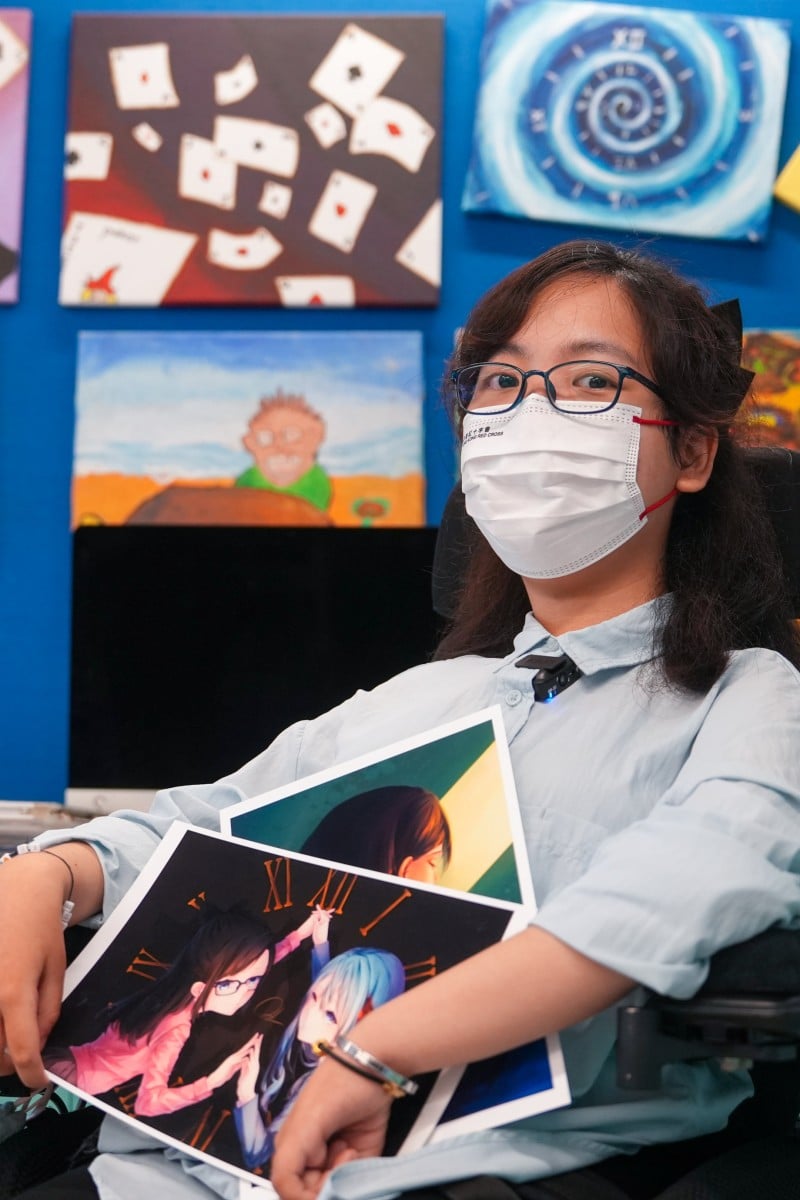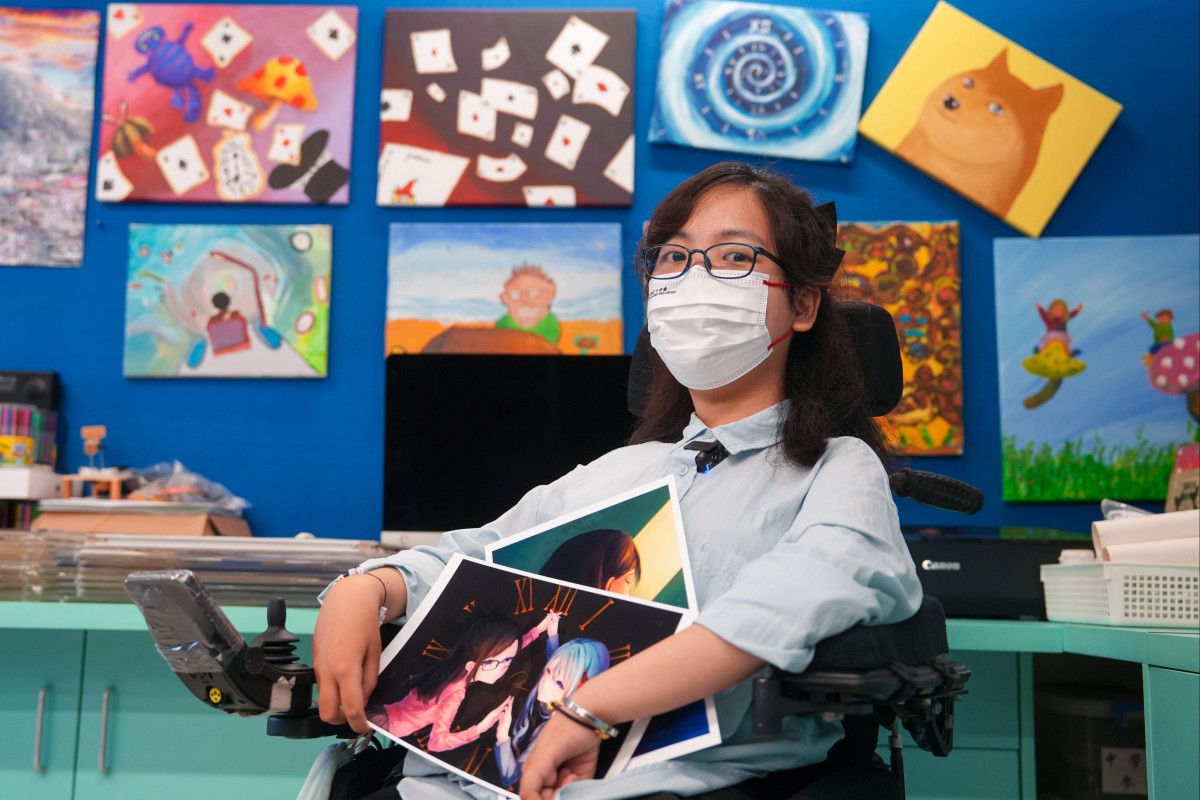
- Pupils explain how they overcame adversity to pass Diploma of Secondary Education exams with flying colours
 Lai Kwan-yi from Hong Kong Red Cross Princess Alexandra School achieved 25 marks on her DSE exams. Photo: Sun Yeung
Lai Kwan-yi from Hong Kong Red Cross Princess Alexandra School achieved 25 marks on her DSE exams. Photo: Sun YeungAlthough 19-year-old Hongkonger Lai Kwan-yi cannot study for long periods of time due to her spinal muscular atrophy, she has not let that stop her from excelling in this year’s university entrance exams.
Lai achieved a score of 25 marks in her best five subjects and a perfect 5** in Chinese for the Diploma of Secondary Education (DSE) exams, the results for which were released to about 49,000 candidates on Wednesday.
“You should know your own goals and abilities – don’t just wait for others to give you resources. You should go and achieve what you want by yourself,” she said.
Her strategies for exam revision included playing back recordings of herself reading out sentence patterns and texts while she was exercising or even showering.
Lai, who scored a level 3 in the visual arts exam, hoped to study fine arts or a similar humanities degree at the Chinese University of Hong Kong.
She said her dream was to become a children’s book illustrator, allowing her to explore the craft’s “innocence and richness” and her interest in psychology.
Lai, who attended Hong Kong Red Cross Princess Alexandra School, was among the 4,100 students with special educational needs who sat this year’s DSE exams.
Pang Ching-ka, a 19-year-old who has cerebral palsy and uses an electric wheelchair, was another from the school who had to make the most of his time spent preparing for exams, as he could not sit still for long periods without having to stretch his muscles.
“I have to be super concentrated when I’m studying because time is limited for me before I have to rest,” he said.
Despite not being able to write as quickly as most of his peers, he scored 25 marks in his best five subjects and a perfect 5** in the accounting part of the business, accounting and financial studies subject.
He received a conditional offer to study accounting at the University of Hong Kong after joining the school’s principal recommendation programme.
Pang said he hoped to pursue a related career in the future.
Yau Wing-yi, who has muscular dystrophy, said she found using an iPad to be less tiring than writing on paper when revising with past exams.
DSE 2024: What to do if your results aren’t what you expected
The Hong Kong Red Cross Princess Alexandra School student also found her study time limited.
“Sometimes, I got really frustrated when I wasn’t improving on my past paper performance but instead getting worse results,” she said.
Yau added she was on the verge of giving up entirely at one point but did not want to “lose everything”.
The 18-year-old received a score of 20 in her top five subjects and a level 5 in economics.
She received a conditional offer from Lingnan University under the principal’s recommendation scheme and said she wanted to study psychology so she could help those struggling with mental health issues.
At Ebenezer School & Home for the Visually Impaired in Pok Fu Lam, Ian Yu Yu-yeung, who has only 8 per cent vision in his right eye and 4 per cent in the other, also achieved a total score of 25 points with a 5** in mathematics.
The 19-year-old, who is the school’s best-performing pupil this year, will study engineering with an extended major in artificial intelligence at the Hong Kong University of Science and Technology.
He said the degree would guarantee “a promising career prospect”.
Yu’s vision has been impaired since birth, but this has not deterred him from pursuing his passion in mathematics and engineering, nor has it put him off his dreams of becoming a game developer.
“Since it’s a trend and I have an interest in computers, I want to use artificial intelligence to design games, such as role-playing games,” he said.
“In the future, I want to pursue engineering. I believe that it’ll allow me to have opportunities to help those in need.”
The pupil moved to St Paul’s College after advancing to Form Three in 2020, while also receiving resource support from the Ebenezer School & Home for the Visually Impaired.
Yu used a portable magnifier to enlarge text so it could be more easily read when preparing for this exams.
Although it took him more time to revise than others, his impairment did not have a major impact on his studies, he said.
Vien Sing Ying-yu, the principal of Hong Kong Red Cross Princess Alexandra School, said performances this year were “extremely satisfactory”, as the school’s six other candidates had also met the requirements to pursue higher education.
“My best advice to students with special needs is that you shouldn’t limit yourself because of your disability,” she said. “I have always encouraged them to use their ‘limitations’ to create unlimited possibilities.”